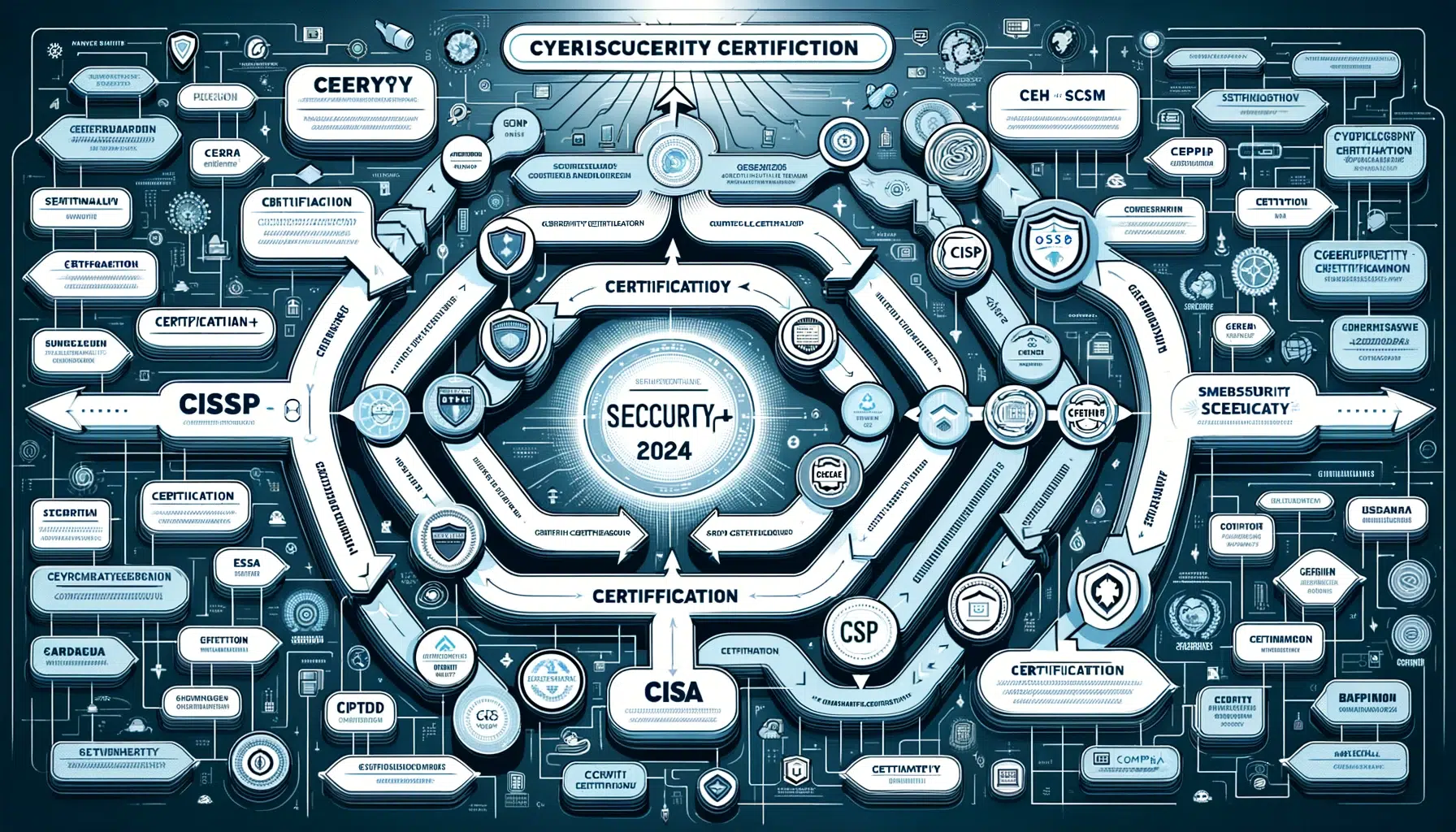Last Updated on June 28, 2024 by Arnav Sharma
In the dynamic field of cybersecurity, professionals face constant challenges and evolving threats. The year 2024 brings with it new complexities and advancements in technology, making it crucial for cybersecurity professionals to stay ahead in their field. This comprehensive guide aims to provide a detailed certification roadmap, exploring various pathways and certifications that cater to different career goals and job roles within the cybersecurity domain.
Cybersecurity Certification: Laying the Foundation
Entry-Level Cybersecurity
Starting a career in cybersecurity often begins with foundational certifications that serve as the entry point for many aspiring professionals. The CompTIA Security+ certification, renowned for its broad coverage of baseline security topics, is ideal for those seeking to establish a firm foundation in network security, compliance, and operational security.
Certified Ethical Hacker (CEH)
The Certified Ethical Hacker (CEH) by EC-Council is another pivotal certification for those interested in ethical hacking and penetration testing. It provides the skills necessary to think and act like a hacker (in a lawful manner), which is crucial for identifying vulnerabilities before malicious attackers can exploit them.
Cybersecurity Certification Path: Specialization and Expertise
Certified Information Systems Security Professional (CISSP)
As professionals seek to deepen their expertise, the Certified Information Systems Security Professional (CISSP) becomes essential. It is designed for security practitioners, managers, and executives, covering critical areas such as security risk management, security architecture, and identity and access management.
Cloud Security and Information Systems
With the rise of cloud computing, certifications like the Certified Cloud Security Professional (CCSP) have gained importance. These certifications focus on advanced cloud security knowledge, covering architectural concepts, design requirements, and managing cloud security.
Roadmap and Career Path: Advanced Certifications and Roles
Certified Information Security Manager (CISM) and Certified Information Systems Auditor (CISA)
For those aiming for higher management or specialized audit roles, the Certified Information Security Manager (CISM) and Certified Information Systems Auditor (CISA) certifications are crucial. They focus on managing, designing, and overseeing an enterprise’s information security.
CompTIA Cybersecurity Career Pathway
The CompTIA certifications offer a structured pathway through their Cybersecurity Career Pathway framework, which aligns cybersecurity certifications with specific job roles, from CompTIA Security+ to CompTIA Advanced Security Practitioner (CASP+), each step designed to build upon the previous one, ensuring a comprehensive growth in skills and knowledge.
Vendor Certifications: Microsoft, AWS, and GCP
Microsoft’s certifications, such as the Microsoft Certified: Security, Compliance, and Identity Fundamentals, provide a foundation in security best practices and technologies specific to Microsoft environments. Then, we have advanced Microsoft certifications, like Cybersecurity Architect or tech-specific certifications.
AWS offers the AWS Certified Security – Specialty certification, which delves into the intricate details of securing AWS services across diverse scenarios.
Google Cloud Platform (GCP) counters with the Professional Cloud Security Engineer certification, focusing on securing GCP resources and managing enterprise security policies.
Each certification path is designed to improve one’s skills and align with the latest security standards and practices, ensuring that professionals are equipped to tackle current and emerging security challenges in specific cloud environments.
Cybersecurity Expert: Beyond Certifications
Hands-On Experience and Continuous Learning
Achieving certifications is just one part of becoming a cybersecurity expert. Hands-on experience in roles such as security operations centers (SOCs), incident response teams, and security architecture is invaluable. Additionally, the field requires continuous learning and updating of skills to tackle new cyber threats and adopt best security practices.
Career Roadmap and Security Professional Development
Professionals must strategically plan their certification journey according to their career goals and the specific job role they aspire to. Whether it’s becoming a cybersecurity analyst, security manager, or a security architect, each certification and experience level helps pave the way to these roles.
2024 and Beyond: Adapting to the Cybersecurity Landscape
The cybersecurity field is expected to evolve with technological advances and changing cyber threat landscapes. Professionals need to stay informed about new certifications and updates to existing ones to maintain relevance in their roles. Security professionals should also be aware of the emerging areas such as artificial intelligence in cybersecurity, blockchain security, and the Internet of Things (IoT) security, which are likely to become more prominent in the coming years.
By understanding and navigating this roadmap effectively, cybersecurity professionals can ensure they are equipped with the knowledge, skills, and credentials needed to succeed and lead in this vital and fast-paced industry.
FAQ:
Q: How does obtaining a cyber security certification validate and enhance one’s capabilities in a cybersecurity role?
Obtaining a cyber security certification validates an individual’s knowledge and skills in managing and safeguarding information within an enterprise security environment. These certifications are crucial as they demonstrate a person’s ability to handle security incidents and contribute effectively to a security program, thereby enhancing their credibility and prospects in cybersecurity jobs.
Q: What specific certifications are recommended for those interested in ethical hacking and offensive security?
For individuals interested in ethical hacking and offensive security, certifications such as the CEH (Certified Ethical Hacker) from EC-Council and CompTIA PenTest+ are highly recommended. These certifications cover comprehensive cybersecurity skills, focusing on offensive security measures to identify vulnerabilities and safeguard against security threats. They provide the foundational and advanced knowledge necessary for roles specifically geared towards application security and testing.
2023
